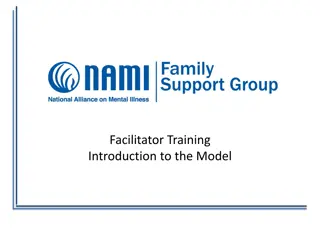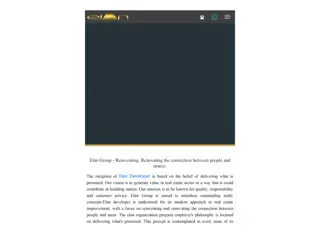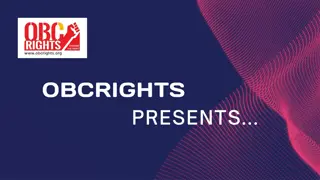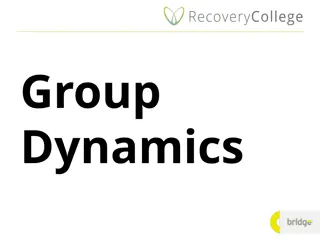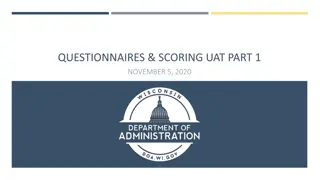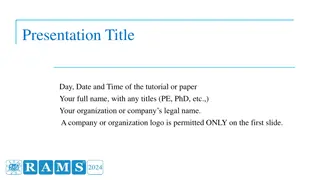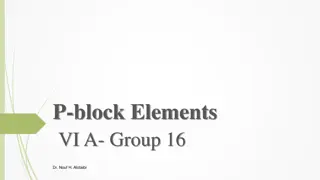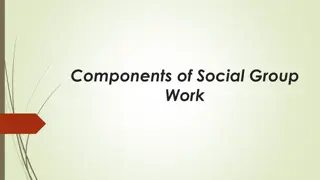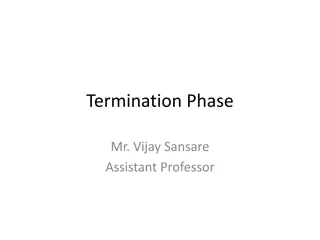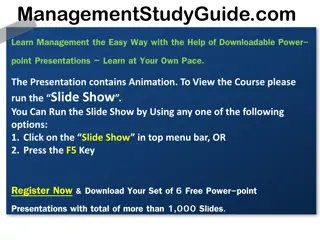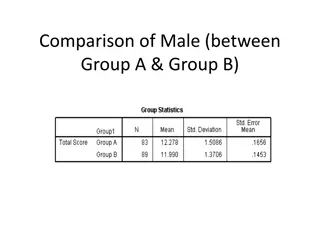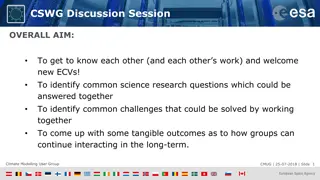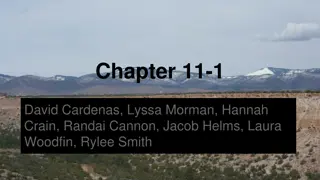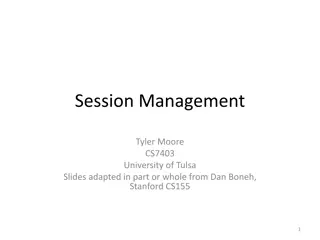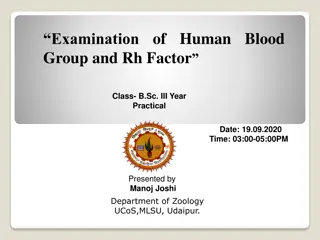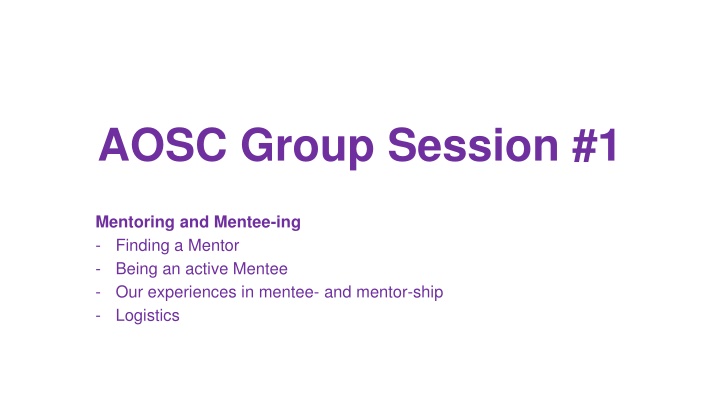
Effective Research Mentoring: Key Attributes and Roles
Learn about the collaborative nature of mentoring in research, the key attributes of effective mentoring relationships, and the different roles mentors play. Discover resources for finding mentors and being an active mentee in your academic and scholarly pursuits.
Download Presentation

Please find below an Image/Link to download the presentation.
The content on the website is provided AS IS for your information and personal use only. It may not be sold, licensed, or shared on other websites without obtaining consent from the author. If you encounter any issues during the download, it is possible that the publisher has removed the file from their server.
You are allowed to download the files provided on this website for personal or commercial use, subject to the condition that they are used lawfully. All files are the property of their respective owners.
The content on the website is provided AS IS for your information and personal use only. It may not be sold, licensed, or shared on other websites without obtaining consent from the author.
E N D
Presentation Transcript
AOSC Group Session #1 Mentoring and Mentee-ing - Finding a Mentor - Being an active Mentee - Our experiences in mentee- and mentor-ship - Logistics
Introductions Who you are! Where you re from What you re interested in (what gets you excited): Clinically Scholarly: Broad definition of research. This can be anything ranging from mechanistic work in experimental models to community-based implementation work to policy and advocacy research!
Where are your resources for AOSC? AOSC/Student Research website: searchable, comprehensive Course materials can be found in eMerg; course guide Your fellow students AOSC group leader 4 year relationship Matt Feinstein and Liza Rivnay
Mentoring is a collaborative learning relationship that proceeds through purposeful stages over time and has the primary goal of helping mentees acquire the essential competencies needed for success in their chosen career. Pfund C. et al. (2016) AIDS and Behavior, Suppl 2: 238-48; McGee, R.M. et al. (2016), AIDS and Behavior, Suppl 2:231-237.
5 key attributes of effective research mentoring Research/scholarship Interpersonal Psychosocial and career Culturally responsive Sponsorship Pfund, C., Byars-Winston, A., Branchaw, J., Hurtado, S., and Eagan, K., Defining Attributes and Metrics of Effective Research Mentoring Relationships, AIDS Behavior, 2016. 20:S238 S248
Mentoring relationships are complex because we expect many different roles in one Mentor: Mentor: passing on advice, knowledge, experience Supervisor: overseeing tasks, research progress, medium term and day to day goals Coach: supporting and enabling learning and development Sponsor: proactively advocating for success Supervisor: Coach: Sponsor: Acad Med. 2016 August; 91(8): 1128 1135. doi:10.1097/ACM.0000000000001026. Also see Diversity and Inclusion at SLAC (https://inclusion.slac.stanford.edu/) ; and Montgomery, B. L., Dodson, J. E., & Johnson, S. M. (2014). Guiding the Way: Mentoring Graduate Students and Junior Faculty for Sustainable Academic Careers. SAGE Open.
Helpful to identify different roles in your mentoring relationship Research/ academic Interpersonal Psychosocial and Career planning Culturally responsive Sponsorship Mentor Supervisor Coach Sponsor/ Advocate
5 Key Attributes of Research Mentoring 1. Research: Attributes for effective mentoring relationships Measurable learning objective: Mentors can Measurable learning objective: Mentees can Developing disciplinary research skills Teach mentees to design and carry out a research project; Provide opportunities to observe techniques Develop the skills to design and carry out a research project Developing technical skills Provide instruction in core disciplinary research techniques Commit to learning and gaining proficiency in disciplinary research techniques Accurately assessing understanding of disciplinary knowledge and skills Assess mentee learning of disciplinary knowledge and skills and provide feedback and guidance to address gaps Self-assess learning of disciplinary knowledge and skills and respond to mentor feedback
5 Key Attributes of Research Mentoring 2. Interpersonal: 2. . Attributes: Mentors can Mentees can Aligning mentor and mentee expectations Establish and communicate mutual expectations for the mentoring relationship Establish and communicate mutual expectations for the mentoring relationship Listening actively Give their undivided attention and listen to both their mentees words and the emotion behind the words Give their undivided attention and listen to their mentors Building trusting and honest relationships Offer honest and open feedback on how the relationship is progressing Offer honest and open feedback on how the relationship is progressing
5 Key Attributes of Research Mentoring 3. Psychosocial and career: Attributes: Mentors can Mentees can Providing motivation and facilitating coping efficacy Scaffold research work in ways that yield periodic success; celebrate the successes and offer support after failures Acknowledge that research frequently involves setbacks and develop strategies to deal with them Developing mentee career self-efficacy Seek opportunities to explore and prepare for a career Foster and affirm mentees career aspirations Developing a sense of belonging Create a welcoming and inclusive research environment, especially at transition points Actively engage and establish relationships with research team members
5 Key Attributes of Research Mentoring 4. Culturally responsive Attributes: Mentors can Mentees can Advancing equity and inclusion Employ strategies for recognizing and addressing issues of equity and inclusion Identify strategies for recognizing and addressing issues of equity and inclusion Being culturally responsive Effectively negotiate dialogue across diverse dimensions Effectively negotiate dialogue across diverse dimensions Reducing the impact of bias Consider their unconscious biases and regularly check that they are not negatively impacting their own or their research team s behavior Recognize unconscious bias, regularly check that it is not negatively impacting their behavior, and address it when they observe it Larmer and Mergendoller, 2015; Gold Standard PBL from www.bie.org
5 Key Attributes of Research Mentoring 5. Sponsorship: Attributes: Mentors can Mentees can Fostering independence Push themselves to increase responsibility for and ownership of their research, while asking for support and guidance as needed Continuously assess mentees development and design increasingly challenging tasks and projects to advance mentees independence Promoting professional development Identify opportunities for mentee professional development and support their engagement in them Identify and engage in opportunities to develop the professional skills needed to become a successful scientist Establishing and fostering mentee professional networks Introduce and facilitate relationship building between their network of colleagues and their mentees Actively identify and seek ways to meet and establish relationships with potential future colleagues in the discipline Actively advocating Report successful outcomes to mentor; Seek out and accept advocacy Promote mentees work; provide professional support Larmer and Mergendoller, 2015; Gold Standard PBL from www.bie.org
What makes a good mentor? Someone who is accessible and responsive Do they answer their emails? Do they cancel meetings with you frequently? Find out who will be the person you work with the most closely on the research team. Is it the faculty member, research coordinator, or fellow? Ideally your mentor has worked with students previously and understands your time limitations
What should you expect from a mentor Help you to define your learning and research goals and review and revise as needed regularly Meet regularly, one-on-one, to discuss your progress to and challenges and provide timely feedback Listen to you and to your ideas Support other opportunities for growth in the areas such as through your training or presentation opportunities Help you create a network within the area as appropriate Integrate into the team Introduce you to other researchers in the area. Acknowledge your contribution to the research, through authorship on abstracts or publications (ore on that later)
Timeline October M2 poster session (M1 s attend!) Rolling submission: Evidence of first author paper submission (AOSC or not), or thesis. Latest: Winter M4 Feb-April: Submit formal research proposal Find a mentor Summer Research Block Develop a research question with mentor M1 M2 M3 M4
Timeline October M2 poster session (M1 s attend!) Rolling submission: Evidence of first author paper submission (AOSC or not), or thesis. Latest: Winter M4 Feb-April: Submit formal research proposal Find a mentor Summer Research Block Develop a research question with mentor M1 M2 M3 M4 If may be interested in RISE: Email Liza.Rivnay@northwestern.edu to set up an introductory meeting with Dr. Feinstein. NO NEED TO BE NERVOUS NOT AN INTERVIEW! Purpose is to explore your interests and position you to succeed with finding a mentor who is potentially able to take on a student for an extra year.
How do I find a mentor? MUST BE Northwestern (FSM or other School) faculty member Medical Student Research Website (link provided) Website (link provided)! Searchable list, including by keyword Organic: Ask around (M2-M4 students) If stuck, several options: Contact a department/division liaison (also on the Website) with a brief statement of interest. They know who does what in their division and volunteered to help students navigate to mentors who may be a fit! Ask your AOSC group leader
How do you contact a potential mentor? If Email: Briefly introduce yourself Purpose for contacting them (ie. AOSC research project) Why are you interested in their specific research? Look at their faculty profile, current work, recent publications. Doing your homework here helps you identify proper mentor and will help the mentor know you re serious! What are you asking for (AOSC) How does this match with your research interests and enthusiasm for gaining/expanding research experience Include your contact information (email, phone, etc.) Ask if they are willing to meet and if they do not have the space, who they might recommend Add your CV (2-4 pages, highlight skills relevant to research) Keep it formal Ask for their availability such as a few time slots in the next X weeks (not give them yours) If no response in 2 weeks, resend . If still not response-consider other mentors Close the loop. If you don t choose a mentor you ve contacted, let them know. Example: Thank you for taking the time to meet, I enjoyed our discussion and learning more about your program. After meeting with several faculty I have decided to work with ____ as my AOSC mentor, and am grateful for your time and effort in discussing research opportunities with me!
Example of email to send out to potential mentors Dear Dr. ______. I am a first year medical student at the Northwestern University Feinberg School of Medicine who will be performing research in the Area of Scholarly Concentration (AOSC) program (http://www.feinberg.northwestern.edu/education/curriculum/learning-strategies/area-scholarly-concentration/). This is a 4 year research program for medical students, performed under the supervision of a Northwestern faculty mentor. I am interested in your work including (SOME DETAILS) My background (IF RELEVANT) I wish to inquire whether you would be willing to meet with me to discuss potential research opportunities with your group. I look forward to your response and potential next steps. Sincerely,
When you meet them, What do you ask? The research program Areas of current and upcoming work New areas of work What projects night be available/feasible The personality and mentoring style and goals of the mentor How how that matches your personality and goals (the roles/attributes) Mentoring and communication How accessible are they The research environment Who is on the team With whom would you be working? Resources to fill in knowledge gaps Previous mentees and experience with AOSC
Bonus (covered more in session #2): How do you come up with a good research topic? Explore some area that interests you and that you will enjoy learning more about Do not worry about the specific topic you can always do additional research later in your training in a specialty area You will not be penalized for doing research in one area then go into another field the worst that will happen is that you need to do additional research in an area that you are now passionate about
What is the question answering? Controversies in the field? Knowledge gaps? Further exploration? Improvement? Impact of contextual factors on implementation Improve or impact beyond prior study? Understanding success or challenge in implementation and/or sustainability Formative questions
What is a good research question? Typically hypothesis driven Question whose answer provides generalizable knowledge Important and either not studied before or needs validation Addressed through rigorous application of scientific methods Feasible to answer Need to be able to answer what is the question ?
What makes a good AOSC project? The topic interests you Even if you are not sure you going into that area You develop a research question that is focused and specific and feasible it is designed to be answered There is a role for you on the project that fits the amount of time you have and when you are available If you need to learn a new skill (i.e. programming or a lab technique), there is someone willing and able to help you It is realistic for a student. Things to consider Are you adding on to an existing IRB? Or do you have to write your own? Are the data collected or reasonable for you to collect? Primary data collection is possible, but more challenging than a chart review A GOOD MENTOR!!
Final Tips on Research Question/Topic Your research questions should pass the so what test Keep it Specific and narrow Your Question leads to a hypothesis A well stated question deserves an answer .
Next Steps and Questions Go to website Meet with me individually! Find a mentor HIGHLY RECOMMENDED: attend M2 AOSC Poster session PLEASE put your last name into any file names you submit!
Workshop Based on what you mentioned you re interested in (what gets you excited) from earlier, discuss ideas and experiences with mentor outreach Goal: Each student determine 2-3 lead candidates for mentor outreach. Can involve group searching on Student Research / AOSC website +/- group leader and other student suggestions.

